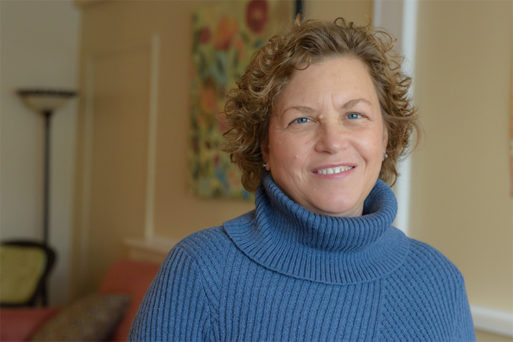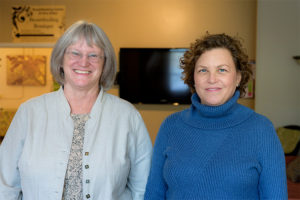Today Sevenponds speaks with Merilynne Rush, founder of Lifespan Doula Association, an organization in Ann Arbor, Michigan, that provides professional End-of-Life Doula training and certification, continuing education programs, mentoring for doulas, and resources and referrals for individuals and families seeking end-of-life support. Merilynne Rush and her Lifespan Doula Association co-founder Patty Brennan are experts in the doula model of care and adult education specialists with decades of teaching experience.
Editor’s Note: This interview has been edited for length and readability.

Credit: lifespanmedia.com
Ellary Allis: What is involved in your training and certification process?
Merilynne Rush: Our training is really broad. We cover what it means to have a good death; understanding and exploring the dying process and how we die; and the needs of both individuals and families. We also teach our students about the role of the doula and the doula model of care, accompanying the dying (vigiling at the bedside and creating a peaceful atmosphere), and understanding hospice and palliative care. We teach them how to get folks into hospice and how to work with the hospice and palliative care team. And then we cover active listening and communication; non-medical comfort measures like guided imagery, visualization, aromatherapy, massage, breathing, and music; creating a ceremony or ritual; and grief and bereavement support. We also talk a lot about self care for doulas and caregivers, and we spend a lot of time talking about the business aspects of becoming a doula, which makes our training unique. We teach our students about practical considerations: how to set up a business, setting boundaries, setting up an LLC or incorporating, taxes, and things like that. My business partner, Patty, has written a business-skills book for birth and postpartum doulas that she’s publishing before the end of the year which covers a lot of this.
After the training, we provide a certificate of attendance. But to get certified you do a lot of additional work: You take a test, there’s required reading; you have to get field experience working with families and provide an evaluation of your work; and you have to develop some forms, such as an intake assessment form. You also have to complete the advance care planning process for yourself and sign an agreement to abide by the scope of practice. And you have to get recertified every three years.
It’s rather complex, but not daunting — not impossible to achieve. I’d like to point to the End-of-Life Doula Alliance, which has a process where you can achieve your Certificate of Proficiency by meeting the core competency listed on the nedalliance.org website. We hope the Certificate of Proficiency is going to become a standard nationwide — a recognized credential that’s the result of a collaboration between multiple programs. There are many programs out there and people that work in hospice don’t know what skills the different programs teach. By forming this National End-of-Life Doula Alliance, we’re combining the expertise of many different programs to come up with standards that will, hopefully, be very meaningful.
Ellary: What does self care for doulas look like? What do you teach people?
Merilynne: We teach people to understand themselves and their own tendencies, and to look out for warning signs of burnout and stress. We talk about the need for having really good systems in place to nurture yourself when you’re doing this kind of work. Having people to talk to and message is really important, as are good boundaries. Those skills can also be useful in helping families recognize their own needs and helping them come up with support systems for themselves.
There are so many ways to perform good self care: having a good social network, having fun, making sure you’re getting enough sleep, eating well and exercising, tapping into your spiritual side, and then everything from mindfulness-based stress reduction to meditation, tapping and havening and alternative therapies. Basically, you can know about all the different therapies and techniques in the world, but if you don’t stop to assess whether you need them and then take time to do them, it doesn’t matter. Knowing about them isn’t the secret, it’s actually taking time to do them and incorporating them into your life. That’s what ends up happening with family caregivers — their health suffers — and working with a doula can really help sustain them.

Credit: secondwavemedia.com
Ellary: Are there any particular stories since you became an end-of-life doula that stand out?
Merilynne: Well, I myself am not working as an end-of-life doula: my primary role is training. I can share stories of people looking for a doula and how we’ve been able to get in touch. For instance, we have a Facebook page where people who become members of Lifespan Doula Association can connect. They can also take monthly educational webinars and get mentoring and referrals. At one point, I put out on the network that someone was looking for a doula, and three doulas responded. They then formed a collaboration to help this one client. It was beautiful, with each of them going once a week. That client ended up getting three visits a week from different people who all communicated with one another and provided well-rounded care for her. They didn’t form an ongoing partnership, it was just for that one woman, but it worked out really well.
Ellary: Those are all the questions that I have. Do you have anything you’d like to add?
Merilynne: Just that I think that there are many people out there that have been doing something like doula work for a long time, and it’s just now that we’re coming together and formulating the profession itself. I think it’s really valid that people are still using whatever term they’re using, whether it’s companion care or death midwife or whatever. People can be self-taught also and have great experience and never have to take a training. Other people will want training. It’s all very individual, and as we professionalize we don’t mean to shut out anybody who doesn’t choose to take the path we recommend. It’s still very valid. I think that’s an important point and I think that you get that idea when you read the NED Alliance website. We’re not trying to shut anybody out, we’re just trying to develop some professionalization for those that want that kind of thing. I guess the basic thing that I feel is that the more doulas there are, the more people will be using their services. We should honor many pathways.
Ellary: Thank you so much for talking with Sevenponds!
Did you miss part one of Merilynne’s interview? If so, you can catch up here.

 What Is the Role of an End-of-Life Doula?
What Is the Role of an End-of-Life Doula?


 First the Wealth Gap, Now the U.S. Has a Growing Health Gap
First the Wealth Gap, Now the U.S. Has a Growing Health Gap

 Our Annual Seven Holiday Gifts for Someone Who Is Grieving, 2024 Edition
Our Annual Seven Holiday Gifts for Someone Who Is Grieving, 2024 Edition














